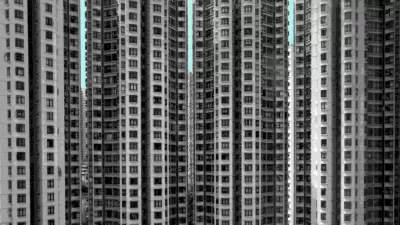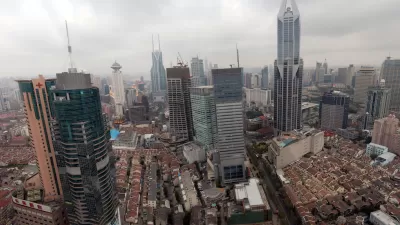A 2,000 year old household registration system in China ties temporary urban workers to rural life.
Chinese migrant workers have little incentive to become permanent residents of the cities they inhabit and work in temporarily while saving up to retire with their families in rural China. Of the 160 million who leave family farms to find work in cities, only 33 million bring their families along.
According to the Director of the Center for Chinese Studies at the University of Michigan Mary Gallagher, rural Chinese value their land and are not willing to give it up for city life where unemployment and a high cost of living are real risks. Because the Chinese government owns all land in China and farmers cannot lease or mortgage it, city workers leave behind relatives who can work the farmland, which provides enough food to feed its tenants.
An added challenge to permanent urbanization in China is the current organization of the household registration system, "hukou."
Tying rural workers to their land, the 2,000 year old hukou system categorizes all Chinese citizens as either rural or urban and links all their social benefits such as health care, education and pension to their place of birth.
Temporary urban workers are not eligible for subsidized public housing, public education beyond elementary school, medical insurance or welfare payments.
While the new administration of Xi Jinping believes in continued urbanization for economic growth, according to Chen Xiwen, head of the Communist Party office on rural policy, China's real urbanization rate is only about 35% rather than the official 53%.
Some cities are more accommodating than others, however. Since the 1990s, Shanghai, Shenzhen and Guangzhou have been allowing people to apply for local hukous if they buy property or invest a large sum in the city. Shanghai also allows those who have lived in the city as temporary tax-payers for seven years to qualify.
FULL STORY: China’s rural-urban balancing act

Alabama: Trump Terminates Settlements for Black Communities Harmed By Raw Sewage
Trump deemed the landmark civil rights agreement “illegal DEI and environmental justice policy.”

Planetizen Federal Action Tracker
A weekly monitor of how Trump’s orders and actions are impacting planners and planning in America.

The 120 Year Old Tiny Home Villages That Sheltered San Francisco’s Earthquake Refugees
More than a century ago, San Francisco mobilized to house thousands of residents displaced by the 1906 earthquake. Could their strategy offer a model for the present?

In Both Crashes and Crime, Public Transportation is Far Safer than Driving
Contrary to popular assumptions, public transportation has far lower crash and crime rates than automobile travel. For safer communities, improve and encourage transit travel.

Report: Zoning Reforms Should Complement Nashville’s Ambitious Transit Plan
Without reform, restrictive zoning codes will limit the impact of the city’s planned transit expansion and could exclude some of the residents who depend on transit the most.

Judge Orders Release of Frozen IRA, IIJA Funding
The decision is a victory for environmental groups who charged that freezing funds for critical infrastructure and disaster response programs caused “real and irreparable harm” to communities.
Urban Design for Planners 1: Software Tools
This six-course series explores essential urban design concepts using open source software and equips planners with the tools they need to participate fully in the urban design process.
Planning for Universal Design
Learn the tools for implementing Universal Design in planning regulations.
Clanton & Associates, Inc.
Jessamine County Fiscal Court
Institute for Housing and Urban Development Studies (IHS)
City of Grandview
Harvard GSD Executive Education
Toledo-Lucas County Plan Commissions
Salt Lake City
NYU Wagner Graduate School of Public Service




























